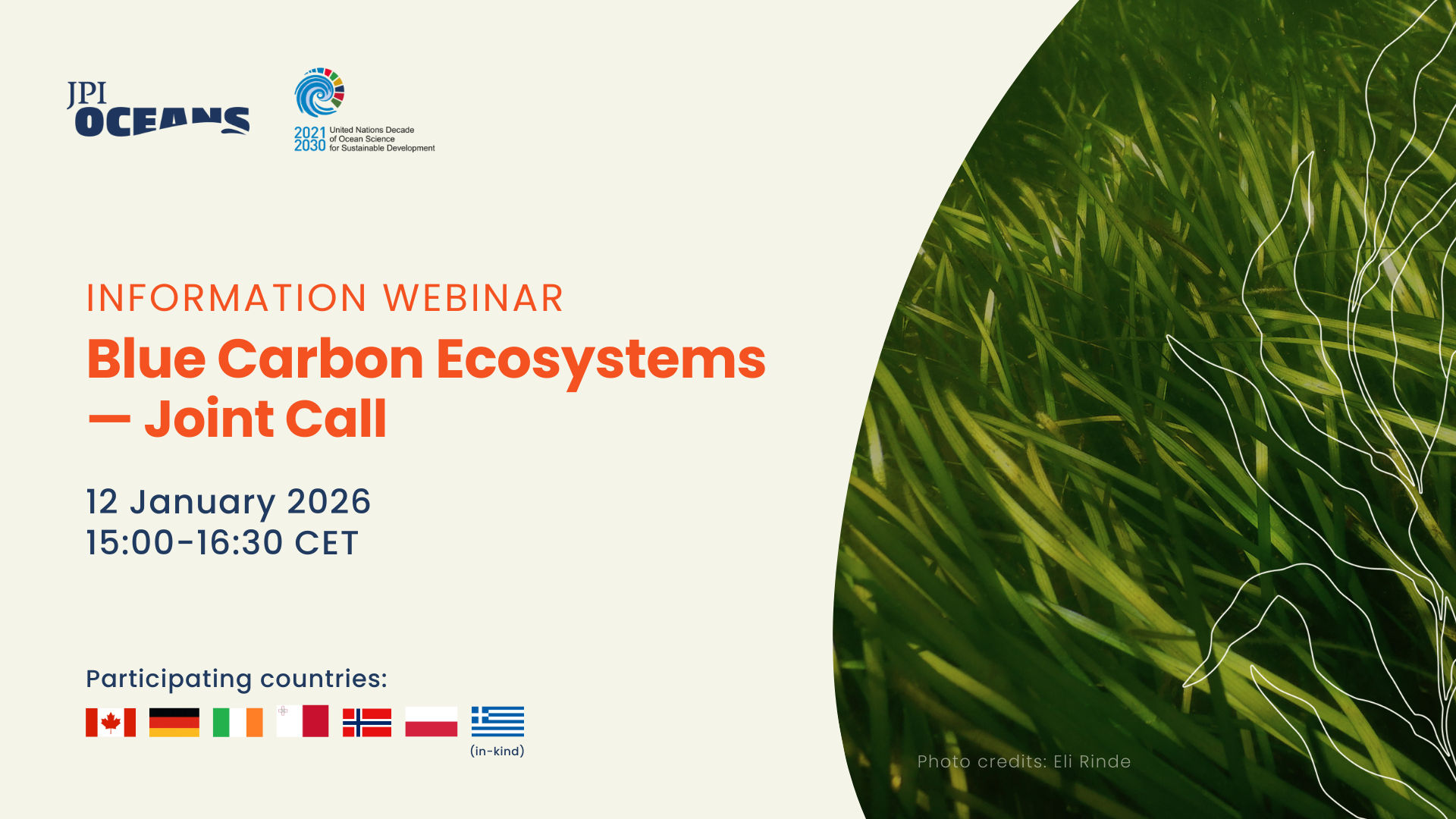Blue carbon ecosystems, including salt marshes, seagrass meadows, and mangrove forests, and increasingly, non-vegetated systems such as macroalgae, unvegetated mudflats, and the water column, play a vital role in capturing and storing carbon, thereby contributing to global climate regulation. Their conservation and restoration not only mitigate climate change but also provide critical co-benefits such as enhancing ecosystem resilience, protecting biodiversity and supporting coastal adaptation.
Yet these ecosystems are increasingly at risk. Climate change impacts (e.g., sea-level rise) and anthropogenic pressures such as coastal development, pollution, dredging, bottom-trawling, and tourism continue to threaten their extent and functions.
The importance of protecting and restoring blue carbon ecosystems is embedded in both European and international frameworks, including the EU Nature Restoration Regulation and the Kunming-Montreal Global Biodiversity Framework. This Call is also closely aligned with the objectives of the UN Ocean Decade and its Global Programme for Blue Carbon (GO-BC), contributing to international efforts to generate knowledge and solutions for climate and biodiversity action.
The scope of this call builds directly on the State-of-the-Art report of the JPI Oceans Blue Carbon Knowledge Hub (led by Ireland, and including Germany, Greece, Malta, Norway, Portugal, and the United Kingdom). This report identified research priorities and provided the scientific foundation for the thematic focus of the call.
Find the full call text here.
Based on the scientific input in the State-of-the-Art report and consultation with participating countries, this Joint Call will fund projects addressing one or more of the following themes:
Carbon stocks and fluxes at local and regional scales, including the climate protection (or mitigation) impact of CO2 and of the relevant non-CO2 GHG emissions such as methane (CH4) and nitrous oxide (N2O).
Blue carbon ecosystems’ resilience and vulnerability to climate change impacts, eutrophication, dredging, trawling, tourism, and other anthropogenic pressures.
Effectiveness and scalability of blue carbon restoration and protection measures, including Nature-based Solutions.
Projects are expected to generate knowledge that contributes to several of the following outcomes:
Scientific data and model simulations on carbon and GHG fluxes;
Standardised methodologies and intercalibration protocols, to allow a direct comparison across different ecosystems;
Policy-and management-relevant recommendations, including best practices for restoration and protection of ecosystems;
Contributions to national and European planning and reporting obligations;
Knowledge products for use by national and regional authorities and stakeholders.
Proposals should also:
Clearly align with one or more of the thematic areas listed above;
Express how they contribute to the outcomes listed above;
Demonstrate relevance to European and/or national policy frameworks;
Include plans for stakeholder engagement and knowledge transfer;
Outline how results will support sustainable management.
The Joint Call is co-branded under the UN Decade of Ocean Science for Sustainable Development.
Each application must involve eligible research partners from at least three funding partner countries; no maximum number of partners is specified. Applicants from countries not funding this call may participate as associate partners with their own resources (cash or in-kind).
The eligibility criteria specified by the respective funding partners must be met. For details, potential applicants must consult the national funding rules in the national guidelines of their respective funding partners participating in the Call (see call text, Annex 1). Questions on the national requirements should be addressed to the relevant National Contact Points (also in Annex 1) before applying.
- Launch of the Call: 04 November 2025
- Deadline for submitting proposals: 2 March 2026 - 14:00 CET
- End of peer-review process: 30 April 2026
- Inform positively ranked institutions: 7 May 2026
- Start of projects: before 15 December 2026
Funding partners from Ireland, Canada, Germany, Malta, Norway, Poland and Greece (in-kind) make available a total of € 5,300,000 for the Joint Call (the final amount is subject to changes according to the exchange rate between euros and Canadian dollars). Each participant in a consortium will be funded by their national partner organisation.
- Marine Institute, Ireland
- Marine Environmental Observation, Prediction and Response Network (MEOPAR), Canada
- Federal Ministry of Research, Technology and Space (BMFTR), Germany
- Xjenza Malta, Malta
- Research Council of Norway, Norway
- National Centre for Research and Development (NCBR), Poland
- Hellenic Centre for Marine Research (HCMR), Greece (in-kind)
HCMR is providing in-kind contribution through access to the Seagrass Ecology Laboratory of the Institute of Oceanography, open to individuals from all partners in a consortium and not limited to Greek institutes, as long as HCMR is included as Associate Partner in the project proposals (see Annex I of the call text for more information).
All proposals must be submitted using the application form.
Coordinators - to register as a new user, please email rims.support@marine.ie with a request for a password and provide details of your organisation and your role in it.
An online information webinar for the JPI Oceans Joint Call on Blue Carbon Ecosystems 2025 took place on Monday, 12 January 2026.
This session introduced the aims of the call, which supports new research to deepen our understanding of blue carbon ecosystems and their role in climate mitigation, adaptation, and biodiversity protection. With €5.3 million in funding available from several partner organisations, the call seeks proposals that strengthen scientific knowledge, improve measurement approaches, and explore effective restoration and protection measures for these vital coastal and marine systems.
If you’d like to learn more about the funding opportunity and how to apply, please access further webinar information below.
Download the webinar presentation
